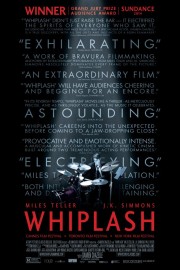Whiplash
I never had a musical instructor like Terrence Fletcher, the character played by (now) Academy Award winner J.K. Simmons in “Whiplash,” but I know the type. They push their students to the brink. Their intensity and drive is meant to take a person further than they ever thought they could go, and go beyond it. Sometimes, that includes taking a person to the point of tears if it means getting through to them. The most influential instructors in my musical development were not like that, though they could be hard. I got a lot out of studying with them. Terrence Fletcher has a lot in common with them in his passion, but his methods are brutal and abusive. He commands respect, though, from his students at the Schaffer Music Conservatory, where he leads the acclaimed studio band. The first time we see him, he walks in on a practice session by freshman drummer Andrew Neyman (Miles Teller). There’s instantly a connection between the two, but this isn’t the inspirational patter of “Mr. Holland’s Opus” but the start of a duel between two equally hard-headed people, one trying to impress, the other one trying to inspire. I don’t see how throwing a chair at Andrew’s head is anything less than insane, but it motivates him. How far is too far, though?
“There are no two words in the English language more harmful than “good job”.” Fletcher says this to Andrew late in “Whiplash,” after events have transpired that lead to neither being at Schaffer anymore. He is right, to an extent; “good job” means that the person saying it wasn’t inspired by what they’ve just seen or heard. The emotions are positive, but in reality, don’t really have any long-term value. As a creative person, you’d almost rather hear negative feedback, because at least they felt something for what you’ve just given them. (Okay, that’s not entirely true, but I think you get my meaning.) Throughout a lot of “Whiplash,” the film writer-director Damien Chazelle made inspired many “good jobs” as it went about the business of showing the battle of wills between Fletcher and Andrew, albeit “good job” with a great soundtrack backing it up. (And as someone only marginally a fan of jazz, it is great.) Maybe I identify too much with the soapy “Mr. Holland’s Opus” narrative of a music teacher that inspired me to really have this resonate with me, although I certainly understand where Andrew and Fletcher are coming from in their passions. The performances by Simmons and Teller are across-the-board great, and the last half hour of the film is a whirlwind of emotions and great filmmaking that utilizes lighting, camerawork, editing, and sound to help accentuate the emotional duel happening between the characters. But Chazelle’s technical assurance can only bring out so much in a relatively pedestrian story that doesn’t really work when Simmons and Teller aren’t sharing the screen. “Whiplash” is a fitting title for the film, but the emotions feel less flying off the screen and more muted and distant. With a title that evocative, you hope for the former.










